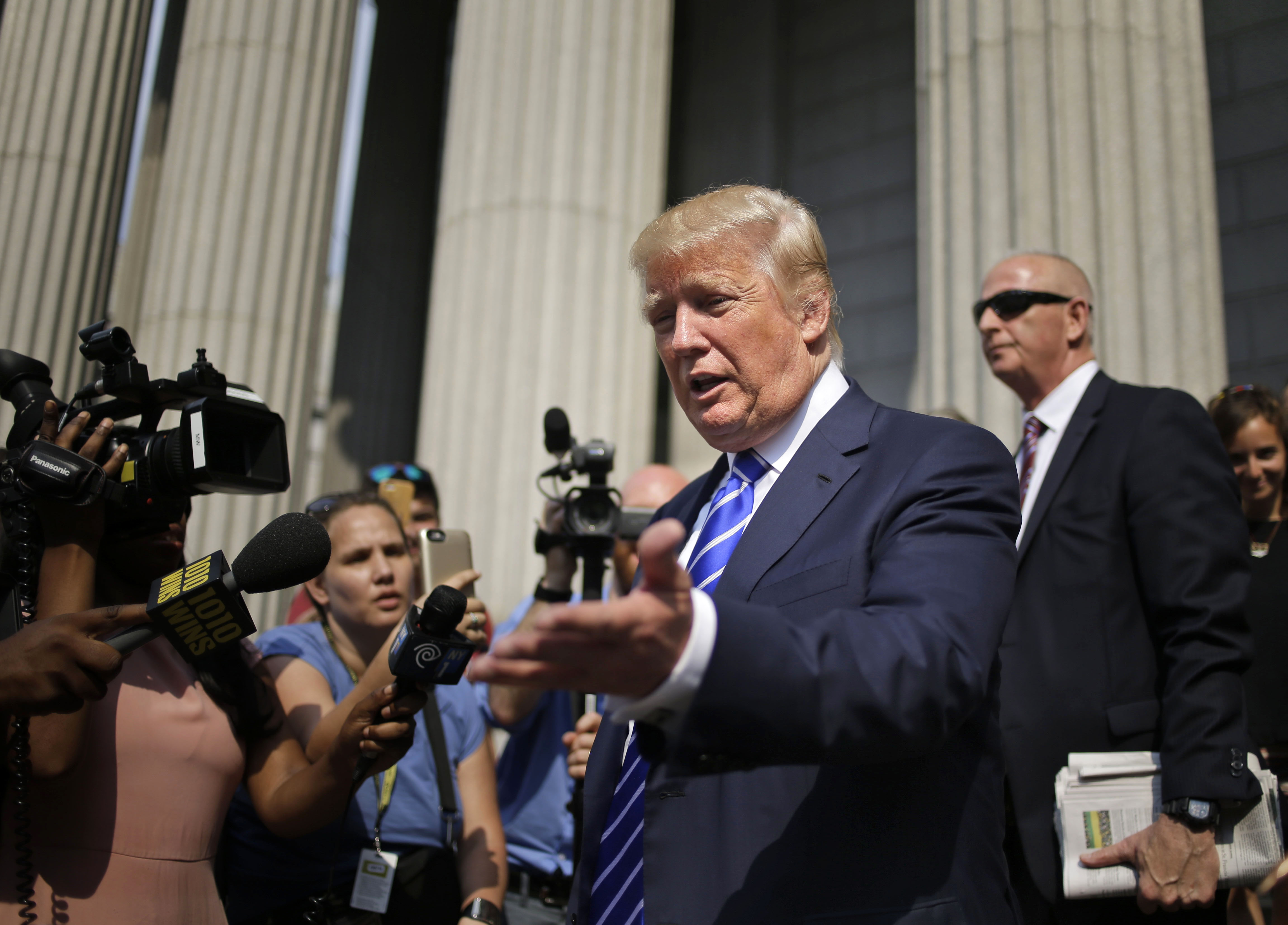Why do Republicans want to besmirch the Constitution with bad European ideas?
Repealing the Fourteenth Amendment is the new policy hotness in the GOP presidential race. Too bad it's one of the best things about the Constitution.


The latest craze in the Republican presidential race is abolishing birthright citizenship, in which anyone who is born in the United States is automatically made a citizen. This is a position that has long been a favorite of the party's nativist wing, but was placed front and center when Donald Trump advocated for it in an immigration white paper. Scott Walker agreed, and even Jeb Bush only lamely argued that it would be tactically difficult to enact. Even Bobby Jindal came out against it — only "for illegal immigrants," but it's still a pretty shocking position given that, as the son of legal immigrants, birthright citizenship is the only reason he is a U.S. citizen in the first place.
This makes a notable contrast with the typical way that conservatives approach constitutional jurisprudence. Birthright citizenship is in the Constitution, which is usually presented as a quasi-holy writ (if not actually the work of Jesus Christ himself). It is a text that must be interpreted as originally intended by those who wrote it. There can be no adapting this weird and antiquated text to new circumstances, even if large portions of it were written by 18th-century slaveowners.
It's doubly strange that conservatives would attack the Fourteenth Amendment, which contains the birthright citizenship provision. It's both a source of genuine American exceptionalism — and thus a key distinguishing characteristic between the U.S. and the nations of Europe — and one of the Reconstruction Amendments, which dramatically improved the Constitution. What gives?
The Week
Escape your echo chamber. Get the facts behind the news, plus analysis from multiple perspectives.

Sign up for The Week's Free Newsletters
From our morning news briefing to a weekly Good News Newsletter, get the best of The Week delivered directly to your inbox.
From our morning news briefing to a weekly Good News Newsletter, get the best of The Week delivered directly to your inbox.
Honestly, before those amendments, the Constitution flat-out stank. One might argue that it was a minor improvement over Britain's constitutional monarchy, which had been developing an increasingly democratic character since the Glorious Revolution of 1688. But on the other hand, presidential democracies are clearly inferior in quality to parliamentary ones. The whole idea of a federation of states is often foolish and sometimes grotesquely unfair. The Electoral College is to this day an embarrassing joke of a process.
But more to the point, before 1865 the Constitution implicitly condoned slavery, and excluded all blacks from citizenship. The Reconstruction Amendments changed it from a document that organized one of the most brutal tyrannies in all of history — the antebellum South — to one that recognized the inherent humanity of all its citizens, in theory at least. The Fourteenth Amendment, by firmly preventing any stripping of citizenship rights from the freed slaves, was key to that process, as was the Thirteenth Amendment banning slavery and the Fifteenth Amendment barring racial discrimination in voting rights.
As historian Eric Foner writes, birthright citizenship really does mark out one area where America is quite different from most of its peers. Among industrialized nations, only Canada and the U.S. still have it. Indeed, with Europe's long history of violent conflict, racial and religious sectarianism, and the subjugation of colonial peoples, being stingy jerks with citizenship status is almost a signature European characteristic.
So if you were dedicated to traditional conservative fetish-worship of the Constitution and suspicion of Old World habits (remember Freedom Fries?), and you also bowed to the universal belief that slavery and Jim Crow were terrible, then it stands to reason that you would think the Fourteenth Amendment was pretty good. If you were concerned with immigration, you might respond that the text is outdated and should be changed — but that's poles apart from the typical conservative view of the Constitution. Indeed, this is how a liberal would go about arguing for the implementation of, say, the Equal Rights Amendment.
A free daily email with the biggest news stories of the day – and the best features from TheWeek.com
If I didn't know any better, it'd be pretty easy to believe that xenophobia is behind the desire to repeal the Fourteenth Amendment, and that "originalism" is merely a veneer of historical legitimacy applied to ordinary political opinions that are basically unconcerned with the content of the Constitution. But that can't be it.
Ryan Cooper is a national correspondent at TheWeek.com. His work has appeared in the Washington Monthly, The New Republic, and the Washington Post.
-
 Shots fired in the US-EU war over digital censorship
Shots fired in the US-EU war over digital censorshipIN THE SPOTLIGHT The Trump administration risks opening a dangerous new front in the battle of real-world consequences for online action
-
 What will the US economy look like in 2026?
What will the US economy look like in 2026?Today’s Big Question Wall Street is bullish, but uncertain
-
 Alaa Abd el-Fattah: should Egyptian dissident be stripped of UK citizenship?
Alaa Abd el-Fattah: should Egyptian dissident be stripped of UK citizenship?Today's Big Question Resurfaced social media posts appear to show the democracy activist calling for the killing of Zionists and police
-
 Bari Weiss’ ‘60 Minutes’ scandal is about more than one report
Bari Weiss’ ‘60 Minutes’ scandal is about more than one reportIN THE SPOTLIGHT By blocking an approved segment on a controversial prison holding US deportees in El Salvador, the editor-in-chief of CBS News has become the main story
-
 Has Zohran Mamdani shown the Democrats how to win again?
Has Zohran Mamdani shown the Democrats how to win again?Today’s Big Question New York City mayoral election touted as victory for left-wing populists but moderate centrist wins elsewhere present more complex path for Democratic Party
-
 Millions turn out for anti-Trump ‘No Kings’ rallies
Millions turn out for anti-Trump ‘No Kings’ ralliesSpeed Read An estimated 7 million people participated, 2 million more than at the first ‘No Kings’ protest in June
-
 Ghislaine Maxwell: angling for a Trump pardon
Ghislaine Maxwell: angling for a Trump pardonTalking Point Convicted sex trafficker's testimony could shed new light on president's links to Jeffrey Epstein
-
 The last words and final moments of 40 presidents
The last words and final moments of 40 presidentsThe Explainer Some are eloquent quotes worthy of the holders of the highest office in the nation, and others... aren't
-
 The JFK files: the truth at last?
The JFK files: the truth at last?In The Spotlight More than 64,000 previously classified documents relating the 1963 assassination of John F. Kennedy have been released by the Trump administration
-
 'Seriously, not literally': how should the world take Donald Trump?
'Seriously, not literally': how should the world take Donald Trump?Today's big question White House rhetoric and reality look likely to become increasingly blurred
-
 Will Trump's 'madman' strategy pay off?
Will Trump's 'madman' strategy pay off?Today's Big Question Incoming US president likes to seem unpredictable but, this time round, world leaders could be wise to his playbook
